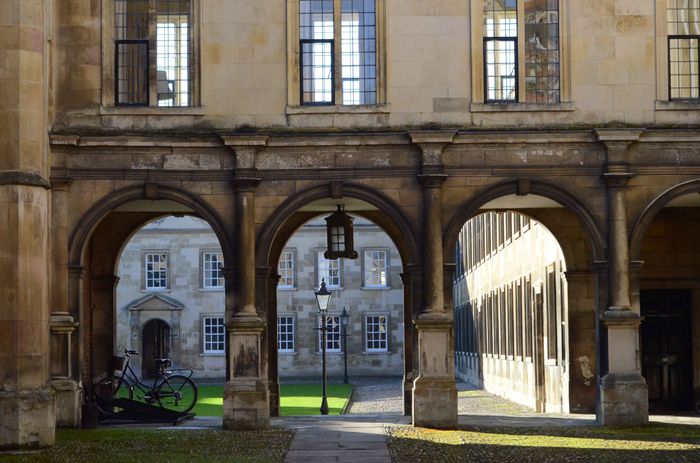Uni clears don accused of ‘abhorrent racism’
The University’s internal investigation launched last year has dismissed all complaints against Nathan Cofnas, and found his ideas ‘represented lawful free speech’

The University of Cambridge will take no disciplinary action against former fellow Nathan Cofnas, after he was accused of “abhorrent racism” for controversial blog posts last year.
An internal investigation into Dr. Cofnas’ comments was launched in 2024, after 58 students made formal complaints accusing the philosophy academic of discrimination against black students.
However, the University’s disciplinary body has dismissed all 58 complaints, claiming that the blog posts did not amount to discrimination or harassment.
In the blog – titled “A Guide for the Hereditarian Revolution” – Cofnas claimed that race was linked to academic ability. He went on to argue that under a true meritocracy, black people would “disappear from almost all high-profile positions outside of sports and entertainment” and that the number of black professors at Harvard would “approach zero”.
He also advocated for the preservation of “racial distinctions,” in society, stating that there “must be some barriers set up between races in order for each one to express its own unique genius”.
The blog posts sparked a widespread student campaign calling for Cofnas’ firing – including a petition that amassed over 1,200 signatures and a protest outside the philosophy faculty.
The University’s investigation found that some of the comments in the blog could have contravened their freedom of speech policies, as they potentially encouraged others to discriminate against black staff and students, and were capable of creating a hostile environment for them on the grounds of race.
However, this could only be the case if Cofnas’ comments were judged to count as harassment or discrimination, which investigators believed was not the case. The report also claimed that the ideas presented in the blog as a whole were an acceptable expression of academic freedom.
Investigators stated that while students “undoubtedly experienced distress and upset after reading the blog,” their complaints focused on “the ideas communicated in the blog with which the complainants found fundamentally objectionable,” which themselves “represented lawful free speech”.
This decision has been slammed by the Cambridge SU Liberation and Welfare Officer, who told Varsity: “Cambridge University’s decision to preserve Nathan Cofnas’ freedom of speech, despite the significant psychological harm his views have caused Black heritage students, demonstrates a failure to show its duty of care to marginalised students.
“As a representative body for students, the SU recognises the importance of freedom of speech. However, no academic should be permitted to question the lack of merit in cohorts of students’ or professor’s positions at an elite institution on the basis of race. The SU affirms that academic commitments to freedom of speech should not supersede our responsibility and commitment to student welfare and racial equity, especially in a climate where students continue to face real and long lasting inequities,” she continued.
The investigation was guided by the University’s controversial freedom of speech policy – which was adopted last year in spite of the legislation it was based on being suspended by the new Labour government.
The policy is designed to allow academics to express “controversial or unpopular opinions within the law, without fear of intolerance or discrimination”. This commitment includes ensuring academics are not “adversely affected” in their careers for holding controversial views.
Cofnas was appointed in 2022 as a Leverhulme Trust early career fellow – a three-year research post – and was affiliated with Emmanuel College. He supervised students at Wolfson, St John’s, and St Catharine’s College, and was appointed to mark first-year philosophy philosophy exams in 2024.
After facing mounting backlash, the fellow voluntarily resigned from his teaching and examining responsibilities in March 2024.
The philosophy academic describes his views as “race realism” which he claimed to be “the scientifically correct position”. This school of thought claims genetics have a significant role in determining human characteristics, such as intelligence.
Varsity understands that Cofnas departed the University following the completion of his 3-year term, and that the researcher has no plans to continue at Cambridge.
Emmanuel College held a ‘town hall’ meeting to discuss the fellow’s employment following a student campaign.
During the meeting, Homerton College principal Simon Woolley – the first black male head of an Oxbridge College – labelled Cofnas’ views as “abhorrent racism masquerading as pseudo intellect.”
“There is no place for bigots in institutions like this,” he said.
The decision not to discipline Cofnas comes in spite of Emmanuel College cutting ties with the Leverhulme trust fellow, claiming that his blog posts were deemed to be “a rejection of diversity, equality, and inclusion (DEI),” that was incompatible with the College’s “core values and mission”.
It also follows Pro-Vice-Chancellor for Education Bhaskar Vira stating in a meeting held by the Philosophy faculty that he believed the early-career fellow “crossed a line,” when it comes to concerns for freedom of speech.
Vira also stated that there had “been failures” in the process of appointing Cofnas as an examiner for philosophy exams, after students had raised concerns about his views.
After Emmanuel cut ties with Cofnas, 14 academics, including five from Cambridge, wrote a letter to The Times calling on the college to reinstate him, claiming there was nothing to investigate in relation to his controversial views.
One of the academics who signed the letter was Peter Singer, an Australian philosopher who previously said that Emmanuel’s definition of freedom of expression “does not include the freedom to challenge its DEI (diversity, equality, and inclusion) policies”.
In their investigation findings, the University claimed that choosing not to discipline Cofnas did not affect their commitment to equality, diversity and inclusion.
Following his departure from Emmanuel, Cofnas sued the college, claiming that their “own rules make it clear that they did not have the authority to dismiss me,” and said he intended to create a precedent protecting “the right of academics to express politically incorrect views about race”.
He claimed that student campaigns for his removal had made it dangerous for him to walk down the street after flyers featuring his face were placed around Cambridge.
The academic has also alleged that he regularly faces discrimination within academic circles, stating that he was “not able to get into a single philosophy PhD programme in the United States” due to his “controversial interests”.
In a statement posted on their website, The University of Cambridge said “Dr Nathan Cofnas published a blog which provoked considerable controversy and prompted a significant number of complaints which the University, as his employer, was duty bound to investigate.
“A rigorous inquiry concluded that his published views, while seen by many as offensive, did not breach the law and did not contravene University regulations designed to uphold free speech,” they concluded.
Nathan Cofnas declined to comment.
 News / Colleges charge different rents for the same Castle Street accommodation2 March 2026
News / Colleges charge different rents for the same Castle Street accommodation2 March 2026 News / King’s hosts open iftar for Ramadan3 March 2026
News / King’s hosts open iftar for Ramadan3 March 2026 Theatre / Lunatics and leisure centres 4 March 2026
Theatre / Lunatics and leisure centres 4 March 2026 News / Angela Merkel among Cambridge honorary degree nominees27 February 2026
News / Angela Merkel among Cambridge honorary degree nominees27 February 2026 News / News in Brief: waterworks, wine woes, and workplace wins 1 March 2026
News / News in Brief: waterworks, wine woes, and workplace wins 1 March 2026








